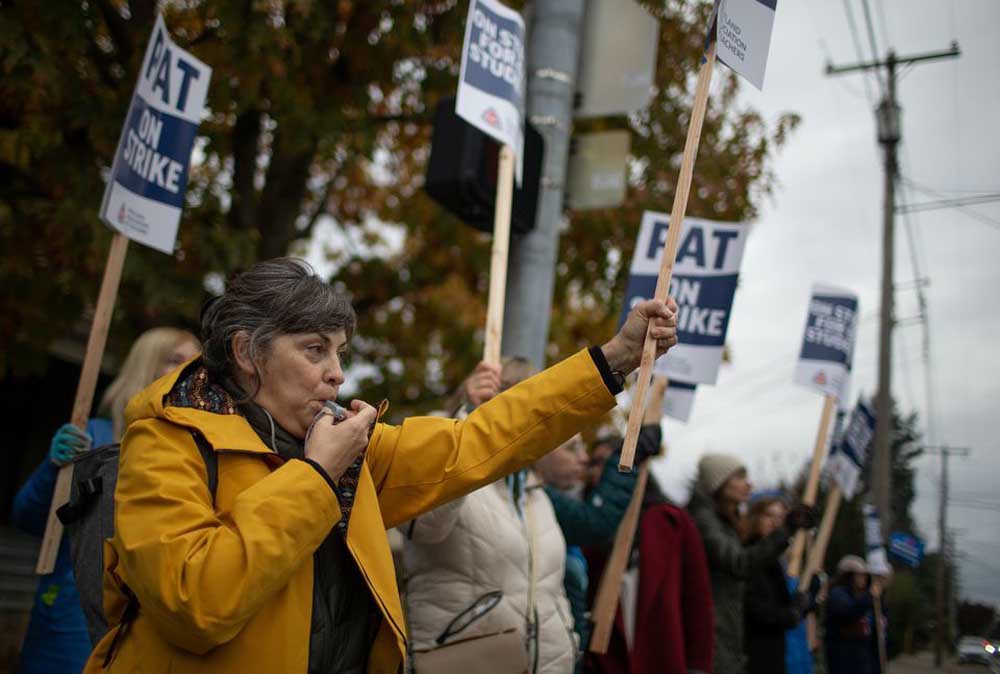This Portland labor advocate pioneered unionizing at the economic fringes. The nation is watching.
Published 6:10 am Friday, December 29, 2023

- Labor unrest in Oregon, including the first strike by Portland Public Schools teachers, has grabbed the attention of union advocates across the nation.
Auto workers. Actors. Teachers. Nurses.
Bursts of labor unrest, both nationally and locally, this year have cast a spotlight on unions and their ability to notch significant gains for workers who belong to them.
That power and potential is what Mark Medina toils to bring to the fringes of Portland’s workforce.
Picture those who serve burgers, sandwiches or donuts at popular chains, for instance. Clerks who stock neighborhood grocery store shelves. Or perhaps even amusement park ride operators.
“These are precisely the kinds of people we need to organize,” said Medina, 34, a labor activist and educator. “They face some of the worst working conditions, some of the worst abuses. All too often, they come from some of the most disadvantaged backgrounds.”
Even as polls show public support for the labor movement in the U.S. at a six-decade high, industries traditionally plagued by low wages and high turnover often remain overlooked by established or mainstream unions.
Medina and a growing crop of union advocates, however, are taking a different tack.
In 2018, as an employee of Pacific Northwest fast food chain Burgerville, Medina organized his fellow workers in Southeast Portland and helped lead them to form a federally recognized union — the first in more than 40 years among fast-food employees nationwide. He later played a pivotal role in ensuring that five unionized Burgerville shops secured a contract with the company that included wage increases, paid vacation and parental leave and job safety improvements, among other perks.
“People didn’t think this could be done,” said Bob Bussel, who spent two decades as the head of the University of Oregon’s Labor Education and Research Center. “That includes those inside the labor movement itself.”
In a few short years, that’s changed dramatically, with the push for unionization penetrating even storied service sector giants such as Starbucks and Amazon.
“It’s a hugely significant moment we’re in,” said Steven Beda, a labor historian at the University of Oregon. “Labor activism comes in waves, in fits and starts. I think the Burgerville Workers Union captured a lot of imaginations and showed what is possible.”
Paying attention
Now with Portland Jobs with Justice, a longtime labor group that advocates for workers on the economic margins, Medina is among a loose band of local activists and organizers focused on spurring the creation of independent unions within the city’s food and retail industries.
Their success has been slow but steadily growing, mostly within businesses patronized by a relatively well-off and progressive customer base. Among them: Voodoo Doughnut; nearly a dozen New Seasons Market locations; Afuri Ramen and Dumpling; and one Potbelly Sandwich Shop and one Buffalo Exchange store, both in downtown.
Other recent union drives have included the Market of Choice on Southeast Belmont Street and employees at Oaks Amusement Park.
“There are great, intelligent, smart, wonderful people who work these jobs,” said Medina, who in his current role teaches others how to organize and unionize their workplaces.
Companies are not always receptive. Federal labor regulators recently accused Starbucks of illegally closing 23 stores, including three locations in Portland, to suppress organizing activity. The coffee chain has denied any wrongdoing.
The Oregon Restaurant & Lodging Association, meanwhile, declined to comment on the rise of independent unions within industries it represents. “We typically do not engage in questions regarding this subject,” spokesperson Lori Little said.
Kevin Van Meter, a fellow at the Charles A. Scontras Center for Labor & Community Education at the University of Southern Maine, said workers in these low-paying industries are disproportionately people of color, women and LGBTQ+ who are being squeezed by stagnant wages and cost of living increases.
“If they don’t fight back, they’ll continue to live in poverty,” he said. “They don’t have a choice except to organize.”
In an interview, Van Meter added that numerous food and retail workers in the Northeast are beginning to wage their own independent union campaigns — and are looking to Oregon for guidance. “They’re paying close attention to what’s happening in Portland,” he said.
‘We will win’
Medina’s passion for improving the lives and working conditions of low-wage employees, he said, is rooted in personal experience. Growing up, he and his Chicano family lived in Los Angeles’ Boyle Heights neighborhood and often struggled to get by.
“I saw how hard my dad worked. I saw how hard my mom worked,” he said. “I also saw the amount of indignity that they and others suffered. I wanted to be a part of something that changes that.”
He moved to Oregon a decade ago and worked as a janitor at a downtown Portland office tower. After time as a shop steward for SEIU Local 49, which represents thousands of building service workers in the city, he took a fast-food job, started organizing his fellow employees and never looked back.
Last month, with the help of Medina, workers at gourmet donut maker Blue Star Donuts requested a union certification election at its six Portland-area locations.
Other food and retail shops are on the near horizon, he said.
“I truly believe that we will win,” Medina said. “I think that we will organize this industry in Portland and we will be able to show workers in other areas, in other cities that you can do it too.”






